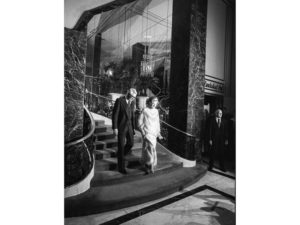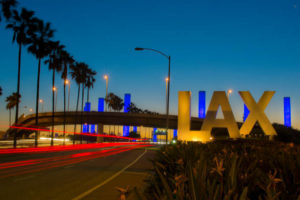A mother and son separated by the Trump administration more than three years ago were finally reunited.
TOP STORIES
A Family Reunited at the Border
More than three years ago, Bryan Chavez hugged his mother, Sandra Ortiz, inside a U.S. immigration office, terrified that he would never see her again.
Chavez went to an immigration facility in California. His mother, who didn’t pass an initial asylum screening, was expelled to Mexico. They were among the earliest family separations during the Trump administration, well before splitting families became publicized U.S. policy. More than a thousand families remain separated, but the long ordeal for Chavez and his mom is over.
On Tuesday afternoon outside the San Ysidro Port of Entry, the main border crossing point into San Diego from Tijuana, the pair were among the first four families separated by the Trump administration to be reunited under the Biden administration, which is touting the homecomings as a way to signal more of a humanitarian approach to immigration.
More Politics
— A day in the California recall: a Hollywood-worthy campaign video from one challenger to Gov. Gavin Newsom, a 1,000-pound bear from another.
— Los Angeles Mayor Eric Garcetti’s name has surfaced again as a possible nominee for a position in the Biden administration, five months after he said he had turned down a federal post.
— House Minority Leader Kevin McCarthy has signaled that he would support ousting Republican Conference Chairwoman Liz Cheney, the most powerful Republican woman in Congress, as tensions rise within the GOP over whether to stake its future on former President Trump.
For more news and analysis, sign up for our Essential Politics newsletter, sent to your inbox three days a week.
Proceeding With Caution
Los Angeles County is seeing new signs of a resurgent economy, with plummeting coronavirus cases allowing for a faster-than-expected reopening of bars and expanded capacity for restaurants and other businesses.
In progressing to the least restrictive yellow tier of California’s color-coded reopening system, the nation’s most populous county will allow a swath of businesses and venues — including restaurants, gyms, movie theaters, amusement parks, stadiums and museums — to operate at higher capacity starting later this week.
The relaxed restrictions, details of which will be released today and go into effect Thursday, are accompanied by a newfound sense of optimism in a region that was a national epicenter of the pandemic just a few months ago.
More Top Coronavirus Headlines
— Confronting concerns that too many Americans aren’t getting vaccinated, President Biden said that his administration was beginning a “new phase” of its COVID-19 inoculation campaign to persuade more people to get a shot, and to make it easier for them to do so.
— L.A. school officials have given up on the idea of extending the school year in the face of opposition from the teachers union and no consensus from parents.
— The California agency that oversees workplace safety fined Amazon.com Inc. $41,000 for failing to record COVID-19 infections among employees at a Rialto facility and to generally protect workers there against potential exposure to the virus.
A Train Wreck Many Saw Coming
It was dubbed the “Golden Line,” the shiny and pricey showpiece of a Mexico City Metro system long plagued by overcrowding, crime and sketchy service.
But the $2-billion new addition, inaugurated with much fanfare in 2012 and formally known as Line 12, soon became infamous for what critics considered shoddy design, safety shutdowns and allegations of corruption in its construction.
On Monday night, Line 12 was the site of the deadliest Metro incident in almost 50 years: An overpass collapsed beneath the weight of an elevated passenger train and sent a section of the train plunging toward the bustling avenue below.
At least 24 people were killed and 79 injured, said city authorities, who blamed “structural damage” for the sudden and catastrophic failure of beams. The aftermath was captured in startling images.
Close Encounters of the Shark Kind
Researchers had long wondered how great white sharks, beyond the rare bites that make headlines, behave around people. Were they curious? Were they skittish? Did they just ignore them?
And in the case of the Southern California coast, are there really that many out there?
The advent of drone photography has begun to provide some answers. For much of the year, great white sharks are along the coast from San Diego to Point Conception. And “so far it looks like sharks just don’t care,” said Christopher Lowe, a professor of marine biology and director of the Shark Lab at Cal State Long Beach.
In this story exclusive to Times subscribers, follow along as Carlos Gauna shoots spectacular drone footage of some close encounters.
.
Ads by: Memento Maxima Digital Marketing
@[email protected]
SPACE RESERVE FOR ADVERTISEMENT
.
FROM THE ARCHIVES
On May 5, 1976, just after her incumbent husband had lost a few Republican primaries to then-Gov. Ronald Reagan, First Lady Betty Ford was on her way a news conference at the Beverly Wilshire when she was photographed with actor Cary Grant. “She said neither she nor the President was upset by his losses in the recent primaries,” The Times would report two days later. (President Ford would go on to win the GOP nomination but lose the general election to Jimmy Carter.)
”Rank counts at the Beverly Wilshire, of course, and an eminent guest may be bumped to make way for the preeminent,” Times staff writer Dorothy Townsend reported in an article on the hotel’s success in drawing the famous and the powerful as guests. “To put up President Ford’s wife in the suite she prefers … the management discreetly had to bump Swedish film director Ingmar Bergman and his wife.”
.
May 5, 1976: Betty Ford descends a mirrored staircase at the Beverly Wilshire, accompanied by Cary Grant, on her way to a news conference in the lobby. This photo appeared in the May 7, 1976, Los Angeles Times. (Michael Mally / Los Angeles Times Archive / UCLA)
CALIFORNIA
— Anti-Asian hate crimes are still surging in Los Angeles and around the country, a new study has found.
— In a major achievement years in the making, the U.S. earthquake early warning system can now issue alerts to cellphone users anywhere on the West Coast.
— A 57-year-old man has been charged with arson in a fire that tore through the historic San Gabriel Mission last summer.
— A generation after the city of Bell bought two mobile home parks to bulk up on affordable housing, city leaders are looking for a way out — but tenants aren’t about to go quietly, columnist Gustavo Arellano writes.
Support our journalism
.
Ads by: Memento Maxima Digital Marketing
@[email protected]
SPACE RESERVE FOR ADVERTISEMENT
.
NATION-WORLD
— The defense attorney for Derek Chauvin, the former Minneapolis police officer convicted of killing George Floyd, has requested a new trial, according to a court document.
— The CDC says the U.S.’s record-low birth rate fell another 4% in 2020, marking the sixth year in a row that the number of births declined.
— Recent pledges by the U.S. and other nations could put the Paris climate accord’s goals within reach — if certain efforts succeed, scientists say. Meanwhile, the U.S.’s new normal temperature is a degree hotter than it was just two decades ago.
— Israeli Prime Minister Benjamin Netanyahu missed a deadline to put together a new governing coalition, raising the possibility that his Likud Party could be pushed into the opposition for the first time in 12 years.
HOLLYWOOD AND THE ARTS
— That off-key ending to the Oscars? It had to be done, the awards show’s producer Steven Soderbergh told The Times. He also shared the lessons he hopes future producers will learn.
— Alison Bechdel had set out to write a lighthearted book about exercise. But “The Secret to Superhuman Strength” turned out to be further excavation of her personal history as she learned to embrace interdependence and accept mortality.
— A new film studio is coming to Hollywood — and not a moment too soon for eager creators short on soundstages.
— Meghan Markle is publishing a children’s book inspired by the father-son bond between Prince Harry and their son, Archie, and featuring watercolor illustrations by L.A.-bred artist Christian Robinson.
BUSINESS
— There may never be a better time to sell a used car. The market is red-hot, thanks to a once-in-a-generation confluence of circumstances brought on by the pandemic that’s sent inventory plunging and asking prices soaring.
— When Bill and Melinda Gates divorce, who will get their $130-million, 66,000-square-foot, tech-savvy mansion, dubbed Xanadu 2.0?
SPORTS
— Now that the Lakers’ chances to repeat as NBA champions are waning, what’s important is for them to forge an identity, writes columnist Dylan Hernández.
— The Dodgers lost a double header to the Chicago Cubs and have now lost 12 of their last 16 games.
Free online games
Get our free daily crossword puzzle, sudoku, word search and arcade games in our new game center at latimes.com/games.
OPINION
— “Herd immunity” may not be in the cards for COVID-19. We need to roll up our sleeves and deal with it by rekindling public interest in vaccines, The Times’ editorial board writes.
— With high housing prices and remote work driving coastal urbanites inland, a deep-seated fear has taken root in pockets of red California that they’re being invaded by liberals, columnist Erika D. Smith writes.
WHAT OUR EDITORS ARE READING
— A wave of undiagnosed cancers is emerging after patients postponed annual screenings, and as cancer clinics and hospitals suspended biopsies and chemotherapy and radiation treatments because of the pandemic. (ProPublica)
— A personal remembrance of the legacy of Sally Ride, the first U.S. woman in space, who died of pancreatic cancer in 2012 and will be honored on a quarter from the U.S. Mint. (Scientific American)
ONLY IN L.A.
Palos Verdes, La Brea, San Vicente — these were the names of some of the vast, vanished ranchos that have marked the maps of Southern California for centuries. And the map of modern L.A. bears more than a passing resemblance to that of boundaries of the ranchos — hunks of land doled out by Spanish governors, and later Mexico, to aristocrats who used the plum spots for cattle grazing and, eventually, something like little kingdoms. But those kingdoms would eventually slip away, writes columnist Patt Morrison, lost to a soap-opera-ish maze of marriages, rivalries and disputed wills.
Comments or ideas? Email us at [email protected]. |



